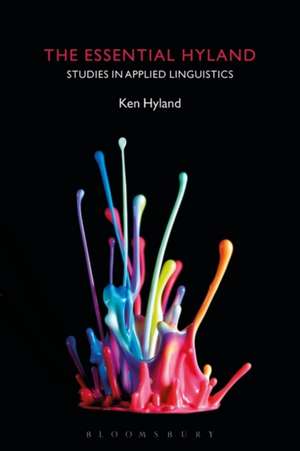The Essential Hyland: Studies in Applied Linguistics
Autor Professor Ken Hylanden Limba Engleză Paperback – 24 ian 2018
| Toate formatele și edițiile | Preț | Express |
|---|---|---|
| Paperback (1) | 206.98 lei 3-5 săpt. | |
| Bloomsbury Publishing – 24 ian 2018 | 206.98 lei 3-5 săpt. | |
| Hardback (1) | 605.21 lei 6-8 săpt. | |
| Bloomsbury Publishing – 24 ian 2018 | 605.21 lei 6-8 săpt. |
Preț: 206.98 lei
Preț vechi: 235.79 lei
-12% Nou
Puncte Express: 310
Preț estimativ în valută:
39.62€ • 43.05$ • 33.30£
39.62€ • 43.05$ • 33.30£
Carte disponibilă
Livrare economică 31 martie-14 aprilie
Preluare comenzi: 021 569.72.76
Specificații
ISBN-13: 9781350037892
ISBN-10: 1350037893
Pagini: 520
Dimensiuni: 156 x 234 x 30 mm
Greutate: 0.81 kg
Editura: Bloomsbury Publishing
Colecția Bloomsbury Academic
Locul publicării:London, United Kingdom
ISBN-10: 1350037893
Pagini: 520
Dimensiuni: 156 x 234 x 30 mm
Greutate: 0.81 kg
Editura: Bloomsbury Publishing
Colecția Bloomsbury Academic
Locul publicării:London, United Kingdom
Caracteristici
This interest in writing is reflected in the growing number of academic journals, international conferences, research papers, books and postgraduate dissertations on the topic, while a Google search on 'academic writing' brings up over 22.5 million hits
Notă biografică
Ken Hyland is the Chair of Applied Linguistics and Director of the Centre of Applied English Studies, University of Hong Kong, SAR China.
Cuprins
PrefacePart 1 Writing, participation and identityIntroduction, Professor John Swales of University of Michigan, USAReflective Commentary, Ken Hyland1. Writing in the university: education, knowledge and reputation. Language Teaching. 46 (1) 53-70. (2013). 2. Discipline: proximity and positioning. Chapter 2 of Disciplinary Identities. Cambridge University Press. pp 22-43. (2012)3. Participation: community and expertise. Chapter 5 of Academic Publishing. Oxford University Press. pp 91-112. (2015)4. Community and individuality: performing identity in Applied Linguistics. Written Communication. 27 (2): 159-188. (2010). Part 2 Interaction, stance and metadiscourse Reflective Commentary, Ken Hyland5. Disciplinary cultures, texts and interactions. chapter 1 of Disciplinary discourses: social interaction in academic writing. University of Michigan Press. pp 1-19 (2004). 6. Stance and engagement: a model of interaction in academic discourse. Discourse Studies. 7 (2): 173-191. (2005).7. Metadiscourse in academic writing: A reappraisal. Applied Linguistics. 25 (2): 156-177 (With Polly Tse) (2004).8. Change of attitude? A diachronic study of stance. Written Communication. 33(3) p. 251-274 (2016)Section 3 - Interactions in peripheral genres Introduction, Professor Vijay Bhatia, City University of Hong Kong, SAR ChinaReflective Commentary, Ken Hyland9. Constructing proximity: relating to readers in popular and professional science. Journal of English for Academic Purposes. 9 (2): 116-127. (2010). 10. Dissertation acknowledgments: The anatomy of a Cinderella genre. Written Communication. 20 (3): 242-268. (2003)11. The presentation of self in scholarly life: identity and marginalization in academic homepages. English for Specific Purposes 30 (4): 286-297. (2011). Part 4 - Features of academic writingProf Diane Belcher, Georgia State University will provide a brief introduction to the sectionReflective Commentary, Ken Hyland12. Academic attribution: citation and the construction of disciplinary knowledge. Applied Linguistics. 20 (3): 341-267. (1999).13. Humble servants of the discipline? Self-mention in research articles. English for Specific Purposes. 20 (3). 207-226. (2001).14. Is there an 'academic Vocabulary'? TESOL Quarterly. 41 (2): 235-254(with Polly Tse) (2007)15. As can be seen: Lexical bundles and disciplinary variation. English for Specific Purposes. 27 (1): 4-21 (2008). Part 5 - Pedagogy and EAPProfessor Ann Johns, San Diego State, USAReflective Commentary, Ken Hyland16. Genre-based pedagogies: a social response to process. Journal of Second Language Writing. 12 (1): 17-29. (2003).17. Nurturing hedges in the ESP curriculum. System, 24 (4): 477-490. (1996).18. Specificity revisited: how far should we go now? English for Specific Purposes. 21 (4): 385-395 (2002).BibliographyIndex
Recenzii
The Essential Hyland is an excellent resource for faculty and graduate students alike ... It could also serve as an introductory core text for undergraduate and graduate students in English composition, professional writing, DA, CL, EAP, ESP, SLW, and TESOL courses ... [This book] is a brilliant idea given the variety of Hyland's topics and their original publication venues.
The high technical quality of the book, in good Bloombsury tradition ... symbolises the importance of the research fields outlined here ... The Essential Hyland is a handbook which covers highly relevant issues of academic writing and which will certainly enjoy continuous success.
The high technical quality of the book, in good Bloombsury tradition ... symbolises the importance of the research fields outlined here ... The Essential Hyland is a handbook which covers highly relevant issues of academic writing and which will certainly enjoy continuous success.
